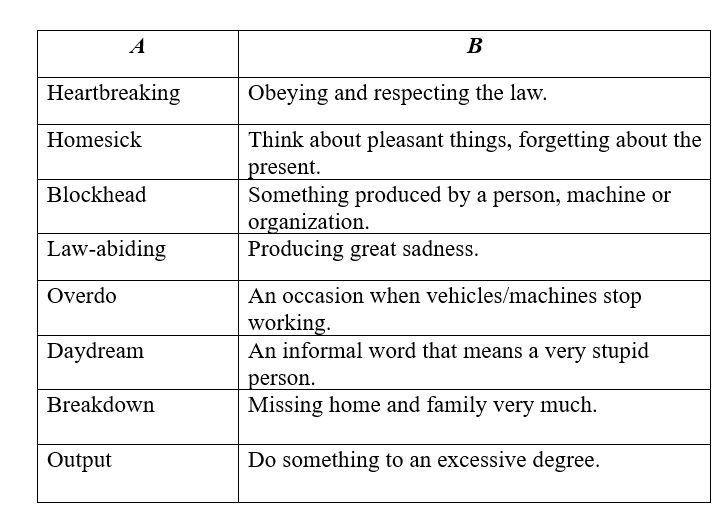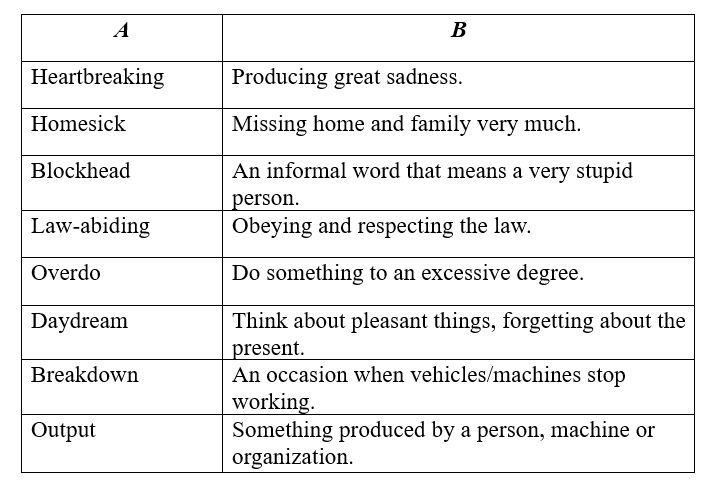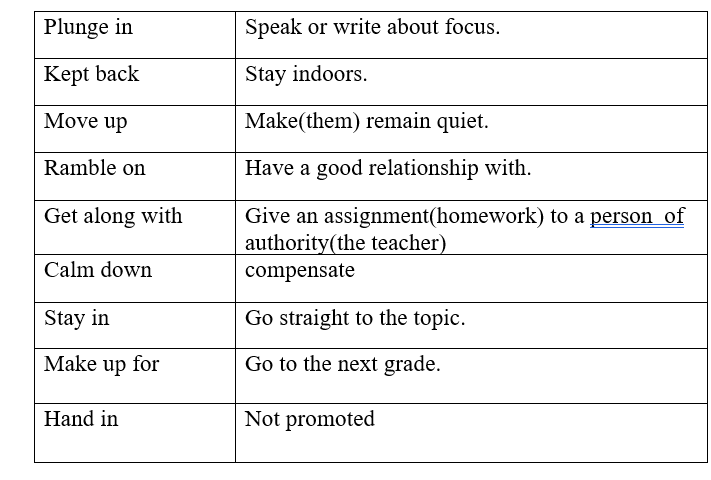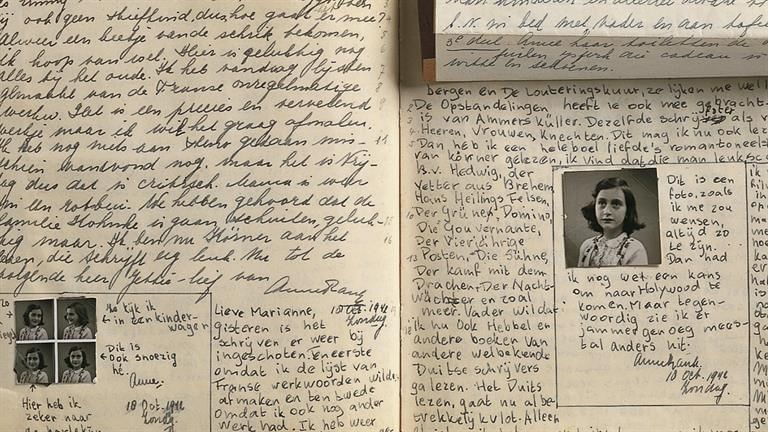NCERT Solutions for Class 10 English Chapter 4 - From the Diary of Anne Frank
Page No. 51
Oral Comprehension Check
Q1: What makes writing in a diary a strange experience for Anne Frank?
Ans: Writing in a diary was a strange experience for Anne Frank because she had never written anything before in a diary as she had received it as a gift on her thirteenth birthday. She considered the diary to be her best friend, where she could write all her thoughts and feelings. However, she also felt that no one would be interested in the musings of a thirteen-year-old schoolgirl. Hence she could write freely in the diary to get all her worries off her chest.
Q2: Why does Anne want to keep a diary?
Ans: Anne always used to feel lonely and upset as she had no friends. She wanted to get all the burdens and worries off her chest. Hence she decided to keep a diary where she could confide her secrets and treat it as a true friend.
Q3: Why did Anne think she could confide more in her diary than in people?
Ans: Anne believed that paper was more patient than people when it came to understanding her thoughts. She found it easier to write down everything she was thinking and feeling in her diary. For her, the diary became the perfect place to share her secrets, as it was her closest companion and wasn't meant for anyone else to read.
Oral Comprehension Check
Q1: Why does Anne provide a brief sketch of her life?
Ans: Anne gave a short overview of her life because she wanted to introduce her family, school, and herself. By reading her diary, she hoped the reader would feel a connection with her and the events happening around her at that time.
Q2: What tells you that Anne loved her grandmother?
Ans: Anne lived at Aachen with her grandmother while her parents settled down in Holland. She was extremely close to her grandmother and wrote about her in her diary. However, when her grandmother died in January 1942, she said, “No one knows how often I think of her and still love her”. She wanted to convey through this message how dearly she loved her grandmother. On her thirteenth birthday, she lit up one candle along with the rest to express her love and gratitude for her beloved grandmother.
Page No. 54
Oral Comprehension Check
Q1: Why was Mr Keesing annoyed with Anne? What did he ask her to do?
Ans: Mr. Keesing was annoyed with Anne because she talked very much in class. He punished her by giving her extra homework to write essays on the subject like ‘A Chatterbox’ to keep her silent and these topics always related to her nature.
Q2: How did Anne justify her being a chatterbox in her essay?
Ans: Anne defended her talkativeness in her essay by explaining that she got it from her mother, who was just as talkative, if not more. She also mentioned that inherited traits like this can't really be changed.
Q3: Do you think Mr Keesing was a strict teacher?
Ans: No, Mr Keesing was not a bad or strict teacher because a teacher did something for the welfare of his students. Any teacher would be annoyed if children keep on talking in the class. Secondly, if he had been strict he would not have laughed at Anne’s funny arguments
Q4: What made Mr Keesing allow Anne to talk in class?
Ans: Anne's final essay, titled ‘Quack, Quack, Quack, Said Mistress Chatterbox,’ was written as a poem and revealed her playful side to Mr. Keesing. He was impressed by how she expressed her points in a rhythmic way. This helped improve their relationship, and after that, he never gave her extra homework again.
Thinking about the Text
Q1: Was Anne right when she said that the world would not be interested in the musings of a thirteen-year-old girl?
Ans: Yes, Anne was right in saying that, as many people tend to dismiss a child’s perspective, believing that children are too immature to understand the complexities of the world. Adults often don’t take children seriously. At just thirteen, Anne felt that most people would overlook a child's view, assuming they lacked the maturity to grasp serious matters.
Yet, Anne Frank’s diary gained global recognition, was translated into numerous languages, and she became one of the most recognized and remembered victims of the Holocaust.
Q2: There are some examples of diary or journal entries in the ‘Before You Read’ section. Compare these with what Anne writes in her diary. What language was the diary originally written in? In what way is Anne’s dairy different?
Ans: Anne's diary, originally written in Dutch, stood out from others in several ways. She named her diary ‘Kitty’ and wrote in a casual, informal style that reflected her carefree teenage spirit. She confided her feelings and secrets in it as she considered her diary to be her best friend. She wrote a lot of personal events and memories in her diary, which made it different from other diaries.
Q3: Why does Anne need to give a brief sketch of her family? Does she treat ‘Kitty’ as an insider or an outsider?
Ans: Anne Frank claims that paper has more patience than people. She usually sits depressed and all alone.
She claims to have no real friends. This lends the reader the perception that there isn’t anybody to take care of Anne Frank. To clear the clouds of doubt, Anne Frank gives the sketch of her adorable father, compassionate mother, kind grandmother, and loving sister. She treated Kitty as an insider because she called it her best friend and was ready to confide in it.
Q4: How does Anne feel about her father, her grandmother, Mrs Kuperus and Mr Keesing? What do these tell you about her?
Ans: Anne had fond memories of her adorable father, her grandmother, Mrs Kuperus, and Mr Keesing, her Maths teacher, who had left indelible impressions on her mind and had a major impact on her life. The way she wrote about all of them in her diary revealed that Anne was very attached to each of these people and was quite good at understanding people. She had developed an everlasting bond and a wonderful interpersonal relationship with each of them.
Q5: What does Anne write in her first essay?
Ans: Mr Keesing had asked Anne to write an essay on the topic ‘A Chatterbox’ as a punishment for her talkative nature. In the essay, she wrote about the effects of being talkative and also argued that she had inherited it from her mother, who was also very talkative. She justified this by saying that nobody could do anything about inherited traits. It was, therefore, difficult to give up a habit so easily, and it also formed a part of a student’s trait. Reading this, Mr Keesing also had a hearty laugh at the argument given by Anne.
Q6: Anne says teachers are most unpredictable. Is Mr Keesing unpredictable? How?
Ans: Anne cited the perfect example of Mr Keesing as an unpredictable teacher because she felt that Mr Keesing was indifferent towards her behaviour and always rebuked her for her talkative nature. Although he punished her initially by assigning extra homework, after reading her essays, he enjoyed a good laugh and thereafter never gave her such punishment and allowed Anne to talk in class.
Q7: What do these statements tell you about Anne Frank as a person?
(i) We don’t seem to be able to get any closer, and that’s the problem. Maybe it’s my fault that we don’t confide in each other.
(ii) I don’t want to jot down the facts in this diary the way most people would, but I want the diary to be my friend.
(iii) Margot went to Holland in December, and I followed in February when I was plunked down on the table as a birthday present for Margot.
(iv) If you ask me, there are so many dummies that about a quarter of the class should be kept back, but teachers are the most unpredictable creatures on earth.
(v) Anyone could ramble on and leave big spaces between the words, but the trick was to come up with convincing arguments to prove the necessity of taking.
Ans:
(i) These lines show that Anne did not have any close friends in whom she could confide her secrets. Therefore, she blamed herself for her reserved nature.
(ii) This line shows that Anne really considered her diary as a friend whom she could trust and narrate all her stories. She did not want just a diary in which she could write down the facts as others did. She considered it as her friend and named her Kitty.
(iii) This statement implies the humorous nature of Anne. She had a witty personality and wrote the line in a funny tone. The words ‘plunked down’ exhibit her sense of humour.
(iv) This statement shows that she had an opinion on everything. She thought that a quarter of her class was full of dummies, signifying that she herself was intelligent enough to make it to the next class. She thought of teachers as the most unpredictable creatures on earth because nobody could say which students they would fail and which students would be passed on to the next class.
(v) This statement implies that Anne was talking about writing. She was given extra homework to write essays by Mr Keesing as a punishment for her talkative nature. Although that was extra work for her, she wanted to do it with full vigour. She did not want to leave big spaces between the words to make the essay look voluminous. She wanted to write convincing arguments to prove the essence of talking. That way, her approach to writing was different from others.
Page No. 55
Thinking about Language
I. Match the compound words under ‘A’ with their meanings under ‘B’. Use each in a sentence.

Ans:
II. 2. Now find the sentences in the lesson that have the phrasal verbs given below. Match them with their meanings.
 Ans: (i) Plunge in − go straight to the topic
Ans: (i) Plunge in − go straight to the topic
Sentence: Since no one would understand a word of my stories to Kitty if I were to plunge right in, I’d better provide a brief sketch of my life, much as I dislike doing so.
(ii) kept back − not promoted
Sentence: The reason, of course, is the forthcoming meeting in which the teachers decide who’ll move up to the next form and who’ll be kept back.
(iii) move up − go to the next grade
Sentence: The reason, of course, is the forthcoming meeting in which the teachers decide who’ll move up to the next form and who’ll be kept back.
(iv) ramble on − speak or write without focus
Sentence: Anyone could ramble on and leave big spaces between the words, but the trick was to come up with convincing arguments to prove the necessity of talking.
(v) get along with − having a good relationship with
Sentence: I get along pretty well with all my teachers.
(vi) calm down − make (them) remain quite
Sentence: Even G.’s pleading advances and my angry outbursts can’t calm them down.
(vii) stay in − stay indoors
Sentence: I thought of this saying on one of those days when I was feeling a little depressed and was sitting at home with my chin in my hands, bored and listless, wondering whether to stay in or go out.
(viii) make up for − compensate
Sentence: This birthday celebration in 1942 was intended to make up for the other.
(ix) hand in − give an assignment (homework) to a person in authority (the teacher)
Sentence: I handed it in, and Mr Keesing had nothing to complain about for two whole lessons.
Page No. 56
III. 1. Here are a few sentences from the text which have idiomatic expressions. Can you say what each means? (You might want to consult a dictionary first.)
1. Our entire class is quaking in its boots. ________________________
2. Until then, we keep telling each other not to lose heart. ___________
3. Mr Keeping was annoyed with me for ages because I talked so much.______________
4. Mr Keeping was trying to play a joke on me with this ridiculous subject, but I’d make sure the joke was on him.______
Ans: 1. Our entire class is quaking in its boots. Shaking with fear and nervousness
2. Until then, we keep telling each other not to lose heart. Not to lose hope
3. Mr. Keeping was annoyed with me for ages because I talked so much. Since a long time
4. Mr. Keeping was trying to play a joke on me with this ridiculous subject, but I’d make sure the joke was on him. He was outwitted by her
2. Here are a few more idiomatic expressions that occur in the text. Try to use them in sentences of your own. Ans: (i) caught my eye: A small red car passing by caught my eye.
Ans: (i) caught my eye: A small red car passing by caught my eye.
(ii) he’d had enough: Harry suffered a lot due to his illness. He’s had enough of mental trauma.
(iii) laugh ourselves silly: One girl said something funny, and we laughed ourselves silly.
(iv) can’t bring me to: I can’t bring myself to eat anything but chocolates.
Page No: 58
IV. You have read the expression ‘not to lose heart’ in this text. Now find out the meanings of the following expressions using the word ‘heart’. Use each of them in a sentence of your own.
1. break somebody’s heart
2. close/dear to the heart
3. from the (bottom of your) heart
4. have a heart
5. have a heart of stone
6. your heart goes out to somebody
Ans: 1. break somebody’s heart − to upset somebody deeply
Sentence: It has, unfortunately, become very easy these days to break somebody’s heart.
2. close/dear to heart − something or someone who is near and close to you
Sentence: The drawing given to me by my little daughter is very close to my heart.
3. from the (bottom of your) heart − genuinely meaning or feeling something
Sentence: He loved his son from the bottom of his heart.
4. have the heart − to evoke the feeling to help someone in distress
Sentence: The poor beggar asked the rich man to have a heart and give him something to eat.
5. have a heart of stone − to not feel anything or any sentiment
Sentence: The cruel landlady has a heart of stone as she beats up her children.
6. your heart goes out to somebody − to sympathize with someone else and understand his feelings
and distress.
Sentence: My heart goes out to the little girl who lost both her parents in a car accident.
Page No. 58
V. Q1: Make a list of the contracted forms in the text. Rewrite them as full forms of two words.
For example: I’ve = I have
Q2: We have seen that some contracted forms can stand for two different full forms:
I’d = I had or I would
Find in the text the contracted forms that stand for two different full forms, and say what these are.
Ans: 1(i) I’ve − I have
(ii) Doesn’t − does not
(iii) Won’t − would not
(iv) I’m − I am
(v) Don’t − do not
(vi) Can’t − cannot
(vii) it’s − it is
(viii) That’s − that is
(ix) I’d − I would
(x) Didn’t − did not
(xi) Who’ll − who will
(xii) You’re − You are
(xiii) We’ll − We will
(xiv) There’s − there is
(xv) He’d − he had
(xvi) Who’s − who is
(xvii) Haven’t − have not
2 (i) I’d − I had or I would
(ii) He’d − He had or he would
(iii) It’s – It is or It has
(iv) Who’s – Who is or Who has
(v) That’s – That is or That has
|
61 videos|893 docs|69 tests
|
FAQs on NCERT Solutions for Class 10 English Chapter 4 - From the Diary of Anne Frank
| 1. What is the main theme of "From the Diary of Anne Frank"? |  |
| 2. How does Anne Frank's diary reflect her personality and thoughts? |  |
| 3. What role does the setting play in "From the Diary of Anne Frank"? |  |
| 4. How does Anne's relationship with her family evolve throughout the diary? |  |
| 5. What impact did "From the Diary of Anne Frank" have on society and literature? |  |




















